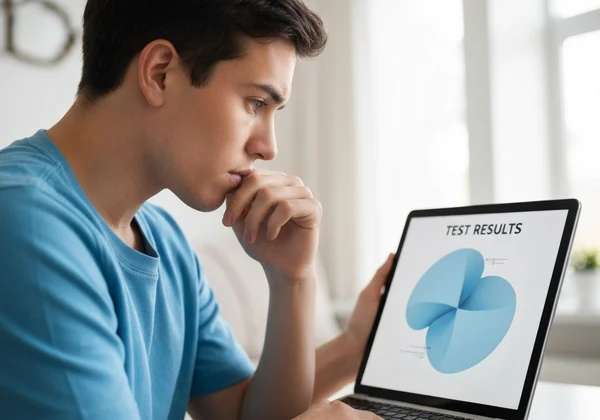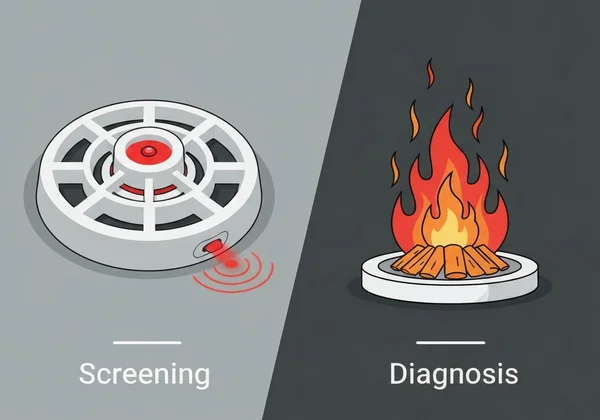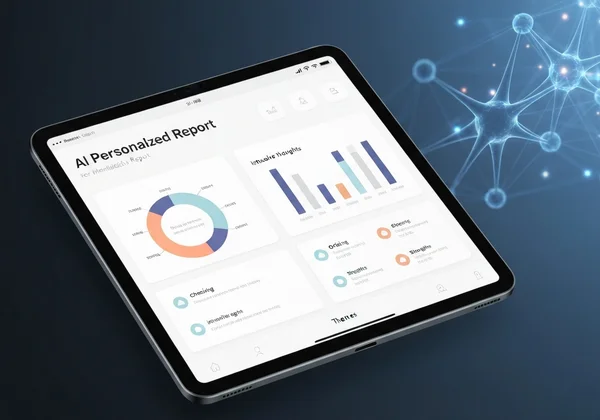OCD Test Results Explained: Next Steps to Professional Help
October 30, 2025 | By Samuel Griffin
You've just completed an OCD test, and now you're holding a result. A wave of feelings might be washing over you: relief, anxiety, confusion, or maybe a bit of all three. This is a completely normal reaction. The big question on your mind is likely the same one that brought you here: How to know if I have OCD? While an online screening is a fantastic first step, understanding what your results mean and what to do next is crucial.
This guide is here to walk you through that process. We'll demystify your score, explore the emotions that come with it, and provide a clear, empathetic roadmap toward getting the professional clarity you deserve. Your journey to understanding is just beginning, and you don't have to walk it alone. This first step of seeking information is a sign of strength, and you can begin to explore your symptoms with our confidential OCD test.

Understanding Your OCD Test Results
Receiving a score can feel like getting a final answer, but it's more like opening a door to deeper understanding. The key is to place the results in the right context. They are a starting point, not a destination.
Screening vs. Diagnosis: What Your Score Really Means
It is vital to understand the difference between a screening and a diagnosis. The preliminary screening tool you completed is designed based on established psychological principles, like the Obsessive-Compulsive Inventory (OCI), to identify patterns of thoughts and behaviors that are common in people with OCD. Think of it as a smoke detector: it’s excellent at alerting you to potential fire, but it can't tell you the cause or size of the blaze.
A formal diagnosis, however, can only be made by a qualified mental health professional, such as a psychologist, psychiatrist, or licensed therapist. They conduct a comprehensive evaluation that includes a detailed interview about your history, symptoms, and how they impact your daily life. An online test is a valuable piece of data, but it’s just one piece of a much larger puzzle.

Interpreting Different Score Ranges on Our OCD Test
Your score likely falls into a range, such as low, moderate, or high likelihood of OCD symptoms. A low score might suggest your experiences are within a typical range of intrusive thoughts or habits. A moderate to high score indicates that your symptoms are consistent with those experienced by individuals with OCD and are likely causing you significant distress.
However, these categories are not absolute. They are indicators designed to guide your next steps. A high score doesn't automatically mean you have OCD, and a lower score doesn't invalidate your struggles if you are still feeling distressed. The most important takeaway is how these symptoms are affecting your quality of life.
The Value of Your AI Personalized Report
This is where our platform offers something unique. If you opted for the AI-powered personalized report, you received insights that go beyond a simple number. This report analyzes your specific responses to identify potential themes in your symptoms, such as checking, ordering, or intrusive thoughts.
It offers a more nuanced perspective on your personal challenges and even potential strengths. This detailed analysis can be an incredibly useful document. It helps organize your thoughts and provides a structured summary you can use for self-reflection or even share with a professional, making that first conversation much easier. If you haven't yet, you can start your assessment to see how it works.

What to Do After Receiving Your OCD Test Results
Okay, you have your results and you understand what they represent. What's the next move? It's about processing the information both emotionally and practically.
Processing Your Feelings and Initial Reactions
Take a moment to breathe. Whatever you are feeling is valid. If your score was high, you might feel scared or overwhelmed. You might also feel a sense of validation, as if someone finally understands what you've been going through. If the score was low, you could feel confused, especially if you continue to struggle.
Avoid judging your feelings. Acknowledge them and sit with them for a bit. Journaling, talking to a trusted friend or family member, or practicing mindfulness can be helpful ways to process these initial reactions. Remember, this result is information, not a label. It's a tool to empower you, not define you.
When to Strongly Consider Professional Consultation
A good rule of thumb is this: if your thoughts and behaviors are causing you significant distress, consuming a lot of your time (e.g., more than an hour a day), or interfering with your work, school, social life, or relationships, it is time to seek professional help.
Your test results can act as the catalyst for this step. Even if your score was in the "borderline" or "moderate" range, the fact that you were concerned enough to seek out and complete a test is a strong indicator that speaking with a professional could be beneficial. Consider using our screening tool as your first step.
Finding a Qualified OCD Therapist: Your Guide
Finding the right therapist can feel daunting, but knowing what to look for makes the process much more manageable. Not all therapists specialize in OCD, so finding someone with the right expertise is critical for effective treatment.
Key Credentials and Specializations to Look For
When searching for a therapist, look for licensed mental health professionals like psychologists (Ph.D., Psy.D.), licensed clinical social workers (LCSW), or licensed professional counselors (LPC). Crucially, you want someone who explicitly states they specialize in treating OCD.
Many therapists will list their specialties on their website or professional directory profile. Look for terms like "Obsessive-Compulsive Disorder," "Anxiety Disorders," and specific treatment modalities like "Cognitive Behavioral Therapy (CBT)" and, most importantly, "Exposure and Response Prevention (ERP)."
Why Exposure and Response Prevention (ERP) is Crucial
Exposure and Response Prevention (ERP) is the gold-standard, evidence-based treatment for OCD. It is a specific type of Cognitive Behavioral Therapy that involves gradually and safely confronting the thoughts, images, and situations that trigger your obsessions (exposure) and resisting the urge to perform a compulsive behavior (response prevention).
This process helps your brain learn that the anxiety subsides on its own without the need for the ritual, breaking the cycle of obsession and compulsion. A therapist who is not trained in ERP may not be able to provide the most effective treatment for OCD. Don't be afraid to ask a potential therapist directly about their experience and training in ERP.
Utilizing Reputable Online Directories and Resources
Several reputable organizations provide directories of qualified OCD specialists. Websites like the International OCD Foundation (IOCDF) and the Anxiety & Depression Association of America (ADAA) have searchable databases of therapists who are trained in treating OCD. These are excellent resources for finding vetted professionals in your area or who offer teletherapy.
Preparing for Your First Professional Consultation
You've found a few potential therapists and are ready to make some calls. Preparing for this first contact will help you feel more confident and ensure you find the best fit for your needs.

Essential Questions to Ask a Potential OCD Therapist
Think of this first call or session as an interview—you are interviewing them just as much as they are assessing you. Here are a few key questions to ask:
- What is your experience in treating OCD?
- What percentage of your practice is focused on clients with OCD?
- What is your approach to treatment? Are you trained in Exposure and Response Prevention (ERP)?
- What can I expect during our first few sessions?
- What are your fees and do you accept my insurance?
What to Expect During Your Initial Assessment Session
The first session is typically an intake or assessment. The therapist will ask many questions about your symptoms, your personal history, your family, and your goals for therapy. It’s an information-gathering session for them to get a full picture of what’s going on.
This is a space for you to be open and honest without fear of judgment. A good therapist will create a safe, non-judgmental environment. You can also use this time to see if you feel comfortable with their style and personality. The therapeutic relationship is a key factor in successful treatment.
Bringing Your OCDTest.net Results to Your Appointment
Remember that AI Personalized Report? Now is the perfect time to use it. Bringing a copy of your results from the OCD test online can be an excellent icebreaker. It provides the therapist with a concise summary of your primary concerns and gives you a structured way to start the conversation.
You can say something like, "I took this online screening test, and these were the results. It really resonated with me, especially this part about..." This can help you articulate experiences that might otherwise be difficult to put into words.
Taking Control: Your Empowered Path Forward After Your OCD Test
Taking an OCD test is a significant and courageous step on your mental health journey. Your results are not a final verdict but a powerful tool for self-awareness and a stepping stone toward getting the right support. You've moved from a place of uncertainty to one of informed action.
By understanding what your results mean, processing your feelings, and learning how to find a qualified professional, you are taking control of your well-being. This path may have its challenges, but it is a path toward relief, understanding, and a fuller life. The journey begins with a single step, and you have already taken it. To continue your journey of self-discovery, discover your results today.
Frequently Asked Questions About OCD Test Results & Next Steps
Can an online OCD test provide a formal diagnosis?
No, an online test like ours is a preliminary screening tool, not a diagnostic instrument. It can indicate the presence and severity of OCD symptoms, but a formal diagnosis must be made by a qualified healthcare professional through a comprehensive clinical evaluation.
What should I do if my OCD test results are borderline or unclear?
If your results are in a borderline range but you are still experiencing distress or impairment in your daily life, it is still highly recommended to consult with a mental health professional. Your personal experience of suffering is more important than any score. You can discuss your specific concerns and the results from the free OCD test with them to gain more clarity.
How long does it usually take to find an effective OCD therapist?
The timeline can vary depending on your location, insurance, and therapist availability. It might take a few weeks to research, make calls, and secure a first appointment. Don't be discouraged if the first person you call isn't the right fit. Finding the right therapeutic relationship is worth the effort.
Is sharing my test results with a therapist really helpful?
Absolutely. Sharing your results, especially a detailed AI-personalized report, can be incredibly helpful. It provides a structured starting point for your first session, helps you organize your thoughts, and gives the therapist immediate insight into your primary concerns, making the initial assessment process more efficient and focused.